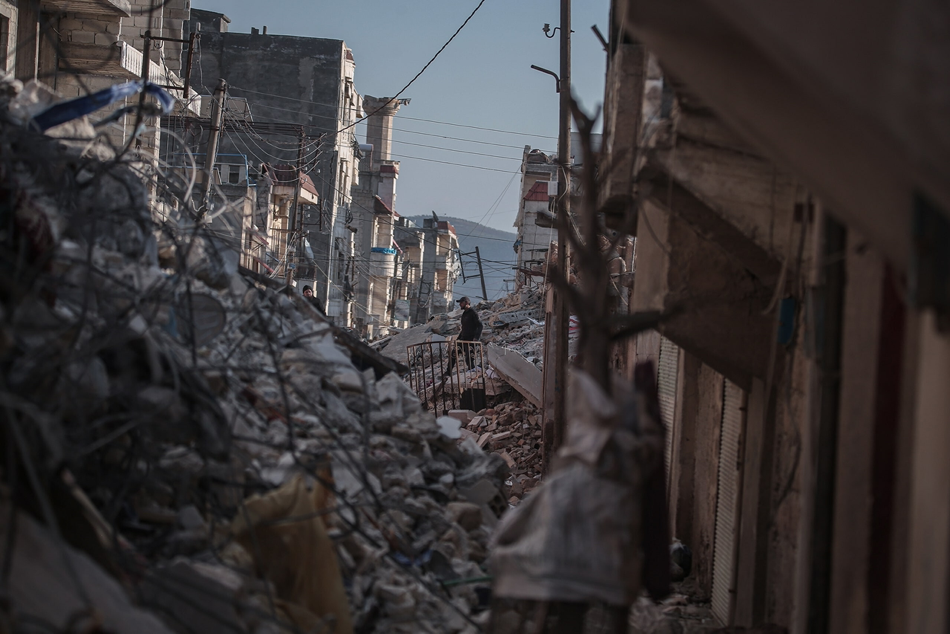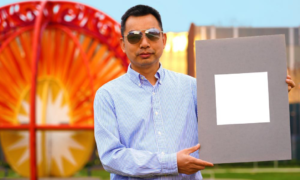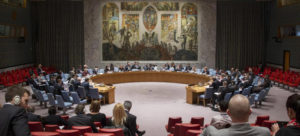In the country’s rebel-held northwest, none of the assistance delivered so far has included rescue equipment.
Two small boys lay in adjacent beds on the ground floor of the main public hospital in Afrin, a small, rebel-held city in northern Syria. The dimly lit room had the sombre silence of an intensive-care unit, punctuated by the soft beeping of heart monitors. A female nurse with a grave look on her face whispered that the mother and father of each child were dead. “They don’t know their parents are dead yet,” she said in broken English. “We tell them they have been taken to a different hospital.” The boy on the left was five years old and was unconscious, his tiny head appearing above the sheet that covered him, his body dwarfed by the hospital bed. His right hand had been broken, and his right foot was bandaged from surgery; both had been operated on. In the bed next to him, a fourteen-year-old boy, slight for his age, was still, with only his eyes moving as he watched me talk to a group of doctors and nurses. His left leg had been operated on as well. I smiled at him, and he stared blankly back. A medical tube was inserted in his nose and taped to his cheek.
Ibrahim Al Yousef, a nurse in pink scrubs, told me that he was pessimistic about the younger boy’s chance of survival. “Before they arrived here, they were in bad condition,” he said. “The rescue teams in the field went to great efforts to save them.” The older boy, he added, was recovering. “This kid is doing well, but the other one is not good,” he said, pausing. “God willing, we hope he will pass this critical condition.”
Both the boys are from Jindires, a small town about twelve miles away dotted with dilapidated cinder-block apartment buildings and small shops. Between rows of olive trees, tents had been erected for survivors of last week’s earthquake. The boys’ homes had collapsed, killing their parents and most of their siblings. Growing up in rebel-held Syria during the country’s brutal, twelve-year civil war, they lived in poverty, were largely cut off from the rest of the world, and faced little chance of anything resembling a stable life. Now the earthquake had turned their futures even grimmer.
Jindires and Afrin were among the worst hit in Syria by the earthquake. Buildings in rebel-controlled parts of the country collapsed on sleeping families just as they had across the border in Turkey, but, in Syria, virtually no one from the outside world came to help. The White Helmets, a volunteer rescue service that has been pulling civilians out of the rubble of homes bombed by Russian and Syrian government air strikes for years, did their best to rescue survivors. But they had none of the advanced rescue equipment brought to Turkey, where teams from around the world flew in with sniffer dogs, sensitive microphones, and seismic sensors. Syrians mostly dug with backhoes, shovels, and bare hands. People told us that there were some buildings, filled with families, from which no survivors had emerged.
They said that the Assad regime and its ally, Russia, are preventing international aid from entering rebel-held areas. Several border crossings with Turkey are within a half hour’s drive from Syria’s disaster zone. So far, though, Assad has only permitted U.N.-distributed aid through one of them, and none of the assistance has included earthquake relief or rescue equipment. In response to criticism, Assad promised to open three border crossings on Monday. Meanwhile, those trapped under the rubble have slowly perished in places like Jindires, and their deaths are a microcosm of what has been happening in northwest Syria for years. Martin Griffiths, the U.N.’s head of emergency relief, tweeted on Sunday, “We have so far failed the people in north-west Syria. They rightly feel abandoned. Looking for international help that hasn’t arrived.”
THE DAILY
The best of The New Yorker, every day, in your in-box.
Though the number of dead remains uncertain, the Mayor of Jindires told us that the death toll stands at twelve hundred. With more aid, it likely could have been lower. After the earthquake struck, just after 4 A.M., survivors overwhelmed the hospital in Afrin. About eight hundred injured people arrived in the first three days, doctors and nurses told me, with another hundred and nine declared dead on arrival. With little ability to pull trapped survivors from collapsed buildings, the number of injured people arriving at the hospital, which is ringed by olive trees, quickly dropped off.
Hospital staffers have developed a grim expertise in treating blunt-force trauma and responding to mass-casualty events after more than a decade of war. They have become experts in keeping people alive. Few places in the world today have endured as much violence for as long a period as rebel-held Syria. Of its almost five million residents, 2.8 million fled there for safety from the Assad regime’s forces. Dr. Yusuf Idris, a surgeon at the hospital in Afrin, told me that, despite years of putting people back together following bombings and artillery stikes, he struggled with the wounds inflicted by the quake. A tall man with a short beard, clad in scrubs, he described the decisions he faced. “Most of the wounded with broken bones can be saved, but smashed bones mean the leg or arm must be amputated, especially if there was a delay of twenty-four or forty-eight hours before they arrived with us,” he said, looking exhausted as he sat in an office chair. “With the war injured, we can easily locate the wound, but with this kind of injury it’s hard; we have to do a full body examination. . . . It could be kidneys or the abdomen.”
Citing the sudden arrival of journalists in the area, he and other hospital staffers bitterly noted that the world seemed more interested in their experiences treating children killed in an earthquake than in their years of fighting to keep children alive during war. They said that they were astounded by the lack of response by the outside world in Syria, compared with Turkey.
International media coverage of the war in Syria, which has killed hundreds of thousands of people and displaced millions, has faded since the Assad regime regained control of large parts of the country with the backing of Russian President Vladimir Putin. But a low-level conflict, with persistently high levels of suffering, continues, as various countries vie for influence in Syria. The Turkish government, which controls entry into the area, has restricted journalists’ access to rebel-held northern Syria in recent years. In the wake of the earthquake, Turkey’s President, Recep Tayyip Erdoğan, whose government has been criticized for its slow response to the earthquake inside Turkey, granted foreign journalists permission to cross the border and provided them with escorts.
Afrin’s main hospital is funded by the Turkish government and Qatari charity organizations. It is staffed by a mix of Turkish and Syrian medical professionals. “We are here to extend the compassionate hand of the State of Turkey to the local people,” a hospital manager, Kenan Karcalar, told a group of reporters, as an official from Erdoğan’s office stood nearby. Residents and hospital patients find themselves caught between the various factions competing for influence in Syria, who fight over areas that millions of displaced children now call home. Afrin is currently controlled by a group of rebels that are backed by the Turkish government. Just a few miles to the south of the Afrin hospital is the province of Idlib, which is controlled by a Sunni rebel group called Hayat Tahrir al-Sham that was formerly allied with Al Qaeda.
Upstairs in the hospital, seven-year-old Mohammed defied the chaos surrounding him. In his short life, he has survived years of war and then, after the earthquake, three days beneath the rubble, beside his family members. Of the ten family members in the house, only Mohammed was pulled from the rubble. He, like the two boys on the floor below, stared out at us from under a gray blanket on a metal-framed hospital bed, not saying a word. On the bed next to him sat Yasmine Marjan, an elderly widow. A distant relative, Yasmine is now Mohammed’s only living family member. She showed me photos on her phone of Mohammed in his parents’ arms, beside their two other children—a little girl and baby boy. All of them smiled. Mohammed gazed into the space in front of him, a bruise across his left temple and an I.V. drip in his hand. Salahuddin Hawa, a comparative-literature professor, blamed the Assad regime and its allies in Moscow and Tehran for the lack of aid reaching rebel-held areas. “How can we explain why many airplanes taking aid to Bashar al-Assad could arrive very peacefully in the Assad area, and we find none here?” he asked. “Imagine that this earthquake happened anywhere else around the world. What would the situation be?” ♦




